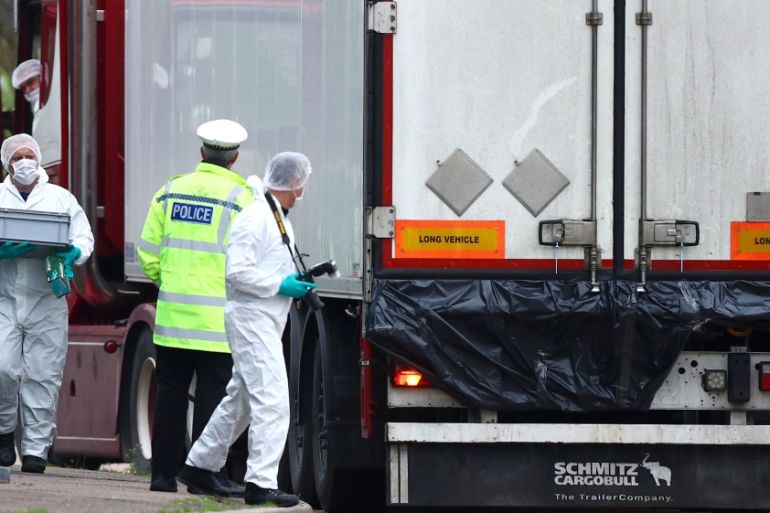UK truck deaths: How Vietnam is still a hotbed of people traffickers
Three years after Al Jazeera uncovered Vietnamese human trafficking practices to the UK, the business is still going strong.

It was a terrifying way to die. The grim discovery of 39 people found frozen to death inside a container at the back of a truck in southern England earlier this month is a stark reminder of the risks people will take in search of a better life.
Police initially believed all the dead were Chinese citizens but more than 20 Vietnamese families, almost all from the same region, have since expressed fears that their loved ones were among the victims. Some say almost all of the 39 victims were Vietnamese.
Keep reading
list of 4 items‘More mainstream’: In the UK, push for slavery reparations gains momentum
Paradise prison: How 107 Bangladeshis became enslaved on a Pacific island
A tale of two cities: Diaspora influx hikes cost of living for Ghanaians
British police have charged the truck’s 25-year-old driver with 39 counts of manslaughter.
The regular and highly dangerous smuggling of people from Vietnam to the United Kingdom was revealed in a 2016 Al Jazeera documentary.
Britain’s Modern Slave Trade revealed that Nghe An province – where families held a vigil for the truck victims last week – is a hotbed of people traffickers.
In one of Vietnam’s poorest regions, criminal gangs often exploit young people who are desperate to go to Western Europe and send money back to their families.
Our undercover operatives in Vietnam, posing as a young couple who wanted to work in the UK, met a people-trafficker in Vinh City. She calmly assured them that she could arrange for the pair to go to England for $32,000.
The people-trafficker in Vinh City told our undercover reporters that her contacts would arrange for the couple to fly from Hanoi to Russia where they would pretend to be foreign students or join a tour group.
From Russia, they would then be driven to Europe and on to the UK.
“I will arrange for you to get to Russia, then take a car to Poland, Germany and then France. Once in France, I will pick you up to go to England. I assure you, it’s really safe,” the trafficker said.
She calmly assured them that the journey would be easy and the whole process could take just a few weeks.
But the reality is that the weeks-long journey is fraught with danger. Physical and sexual abuse is common. Some make it safely to England, find jobs and are able to send money home. But many others are forced into modern-day slavery when they reach the UK.
The people-trafficker said she had a contact there who could offer our female undercover reporter a job in a nail salon.
The investigation revealed many Vietnamese women smuggled into the UK manage to find work in nail salons but some are made to work long hours for little or no pay – and are forced into prostitution in the evening.
As part of our investigation, another undercover Vietnamese reporter started working for no pay in a nail salon in Romford, eastern London.
Doused in petrol
Another worker at the nail salon told her she was smuggled into England in a truck.
She said that the truck “passengers” were doused in petrol to confuse the sniffer dogs at Channel ports, and they were told to wear adult-sized nappies as there was no break during the journey.
The investigation also revealed that many nail bars were run by criminal gangs who also operated cannabis farms generating millions of pounds a year. Vietnamese men were often put to work at these cannabis farms, unaware of the horrendous conditions they would be facing.
Our reporter expressed an interest in working at a cannabis farm and was put in touch with a Vietnamese teenager who was just 17, and looked after a “farm” in Ilford, eastern London.
Eventually, the reporter persuaded the cannabis “gardener” to show her his place of work. The “farm” was, in fact, an ordinary-looking suburban terraced house. Inside, almost every square inch was covered with cannabis plants.
The young “gardener” explained how cables are cut so criminals can steal the huge amount of electricity required to grow the plants.
He also explained how he was unable to leave the house, spoke no English, had his passport confiscated, slept on a mattress under the stairs and was brought food late at night by a member of the gang. He said he suffered from loneliness and depression.
“Staying in the house all the time is like being in prison,” he said.
His dream was that one day he would make enough money to leave the cannabis “farm” and send money home to his family but he admitted the money he had been promised had not materialised.
The 39 deaths in the truck provide chilling evidence that the trafficking of people from Vietnam and other Asian countries continues.